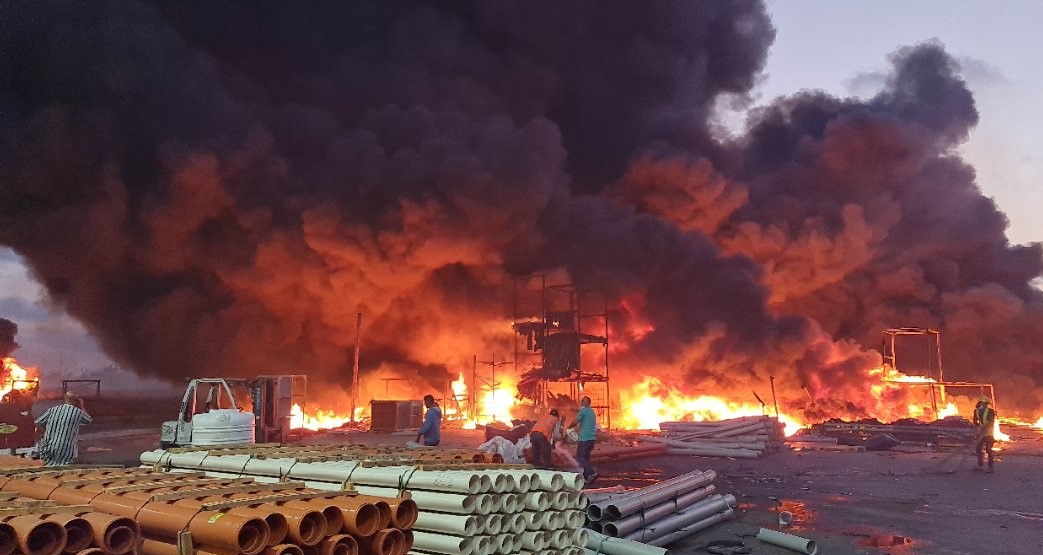The Israeli military attack on the Gaza Strip in May 2021 had catastrophic economic effects, especially on the productive sector, and caused direct and indirect losses exceeding half a billion dollars in various sectors, Euro-Mediterranean Human Rights Monitor said in a report released last week.
Titled “Left in Tatters,” the report stated that the Israeli army carried focused air and guided artillery attacks on economic facilities including various factories and production units.
In addition to targeting production facilities in different areas in Gaza, the Israeli army deliberately targeted the Gaza Industrial Estate (GIE), one of the largest production complexes in Gaza where many of Gaza’s production operations take place, as it contains dozens of factories and companies that employ hundreds of workers.
Euro-Med Monitor’s Chief Media Officer, Nour Alwan, said, “By examining the Israeli army’s behavior and the nature of the precise munitions it used to target economic facilities, it becomes obvious that Israel may have deliberately targeted the productive sector in Gaza to cause severe and long-term damage to its productive capacities and stifle any efforts to achieve economic development in the beleaguered sector for more than 15 years.” On May 10, 2021, the Israeli army began a large-scale military attack on the Gaza Strip that lasted 11 days, during which Israel carried out thousands of air and artillery attacks on the enclave that is inhabited by 2 million people. The attack killed 254 Palestinians, including 66 children and 39 women, destroyed thousands of housing units and economic facilities, and caused significant damage to infrastructure.
During the military attack, that Israel called “Operation Guardian of the Walls,” the Israeli army committed multiple and complex human rights violations, which may amount to war crimes and crimes against humanity. The Israeli army used massive firepower against densely populated civilian areas, violating a number of basic human rights, most notably the right to life, the right to housing, the right to work and earn a living, and the right to property.
The report pointed out that the direct Israeli attacks caused widespread damage and destruction to more than 100 factories, residential buildings, towers that contained multi-service shops, industrial workshops, educational institutions, training centers, and agricultural areas, some of which contained livestock and poultry farms.
The fishing sector also received a major blow after Israel closed the sea, preventing fishing throughout the attack and its aftermath and repeatedly reduced the fishing area from time to time as a form of collective punishment, the report said.
The Israeli attack also caused indirect damages, no less serious than those it caused directly, by disrupting economic activities such as factories, workshops, farms, fishing, and other economic activities.
In addition, closing the crossings prevented exports and imports of raw materials, causing huge losses in various economic sectors.
The report concluded that direct and indirect losses of more than half a billion dollars were inflicted on various economic sectors in Gaza, which already has a fragile economy due to the 15-year-old blockade and political division.
The destruction and obstruction of the work of factories and production facilities caused thousands of workers to be unable to work and an increase in the unemployment rate, which is already high in Gaza, reaching about 49% in general and more than 67% among young people and graduates.
The report called on the Israeli authorities to open a serious investigation into targeting the economic sector in Gaza; hold the perpetrators accountable; and spare civilians, their property, and economic facilities the violence of war.
It also called on the UN Security Council to open an investigation into the grave violations committed by the Israeli forces during their attack on Gaza including the killing of civilians; targeting of their property; and the deliberate destruction and damage of media headquarters, agricultural lands, and economic facilities that support and provide services to hundreds of thousands.
The report also called on the International Criminal Court to investigate the Israeli attacks on the productive sectors in Gaza and take legal requirements that would end impunity for the perpetrators, and the international community to pressure the Israeli authorities to lift the strict restrictions imposed on Gaza, allow the entry of raw materials for the reconstruction process, and compensate the civilian population for the losses they suffered.
During the past months, Euro-Med Monitor released a series of reports on the Israeli military attack on Gaza last May, including “Inescapable Hell” and “One War Older.” The reports aimed at investigating the Israeli violations during the attack and pushing for accountability for those involved in the human rights violations.



